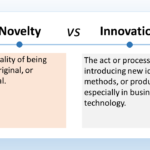The difference between novelty and innovation lies in the significance and impact of the newness.
Novelty refers to the state of being new or unusual, often without regard to utility.
Innovation encompasses the practical implementation of novel ideas that bring about meaningful change or improvement.

Definition
Novelty
Novelty is a quality of being new, original, or unusual, often characterized by its uniqueness or departure from the norm.
- Characteristics of Novelty:
- Freshness: Represents something recently introduced or not previously known.
- Unusual: Can be surprising, odd, or unexpected.
- Limited Impact: May not necessarily result in practical or long-term value.
Innovation
Innovation is the introduction and application of new ideas, processes, products, or services that effectively create significant value or progress.
- Characteristics of Innovation:
- Practical Application: Involves applying ideas in a way that solves real problems.
- Sustainable Impact: Leads to durable change and often addresses a specific need or gap.
- Value Creation: Delivers measurable improvements or benefits, such as increased efficiency or economic growth.
More Synonyms on innovation, innovate and innovative
Innovation Terms

Innovation is considered as a driving force in progress.
It includes the introduction of novel ideas, methods, or products that bring positive change and advancement.
For more information about innovations, check our glossary
Relationship and Relevance
A novelty can be a precursor to innovation when it sparks an idea that is developed into a practical and valuable application. However, not all novelties become innovations. Innovations are distinguished by their meaningful impact and the value they add, going beyond mere newness to effect real change.
Novelty is about creating something new or different, but it does not necessarily change the underlying industry or business model.
- Novelty is about incremental changes or new features added to existing products, like new toothpaste flavors or designs. It helps differentiate products but does not fundamentally alter the industry.
Innovation, on the other hand, is about creating something truly new that disrupts the status quo and changes the way an industry operates.
- Innovation involves developing new technologies, business models or solutions that challenge the existing way of doing things. It can redefine industries, like how Uber disrupted the taxi industry or how iTunes changed the music industry.
In summary:
- Novelty is about creating something new, but within the existing framework.
- Innovation is about creating something new that transforms the underlying industry or business.
Novelty is often confused with innovation, but the search results emphasize that not all novel ideas are truly innovative. For an idea to be considered innovative, it needs to drive significant change and impact, not just provide a new feature or product.
The key distinction is that innovation goes beyond just creating something new - it fundamentally changes how an industry or business operates, while novelty is more about incremental improvements or new features within the existing system.
Context for Using Each Term
- Novelty is used when emphasizing the newness or uniqueness of an object, idea, or situation, often with an implication of being short-lived or for entertainment.
- Innovation is used when discussing the creation and successful implementation of new ideas that address specific challenges or create significant advancements.
Example of Utilization
A toy with a unique design that catches the eye but does not offer lasting engagement or improvement to playtime is a novelty. A new educational toy that revolutionizes learning engagement for children with developmental challenges, gaining widespread adoption and acclaim, is an innovation.
In conclusion, novelty refers to the state of being new or different, often with an emphasis on uniqueness, while innovation is about harnessing the new to produce solutions or advancements that have a substantial and often enduring impact.
FAQ
Q1: Can something be both novel and innovative?
A1: Yes, many innovations start as novel ideas, but they become innovative when they create significant value or solve important problems.
Q2: Is novelty always valuable?
A2: Not necessarily. While novelty can attract attention, its value often depends on its ability to fulfill a need or create lasting impact.
Q3: How do businesses balance novelty and innovation?
A3: Successful businesses often use novelty to capture initial interest but focus on innovation to create lasting value and competitive advantage.
Q4: Can innovation occur without novelty?
A4: While most innovations involve some degree of novelty, incremental innovations might not be perceived as entirely new but still create significant value.
Q5: Is it easier to achieve novelty or innovation?
A5: Generally, achieving novelty is often easier as it only requires being different or new. Innovation is typically more challenging as it requires creating meaningful value and solving problems effectively.
- What's the Difference Between Novelty and Innovation? Let's Discuss
- Innovation versus Novelty: Know the Difference
- How Novelty is Important to Innovation
- Innovation vs. Novelty: What is the Difference
- Why the Enterprise Needs Lean Product Development

